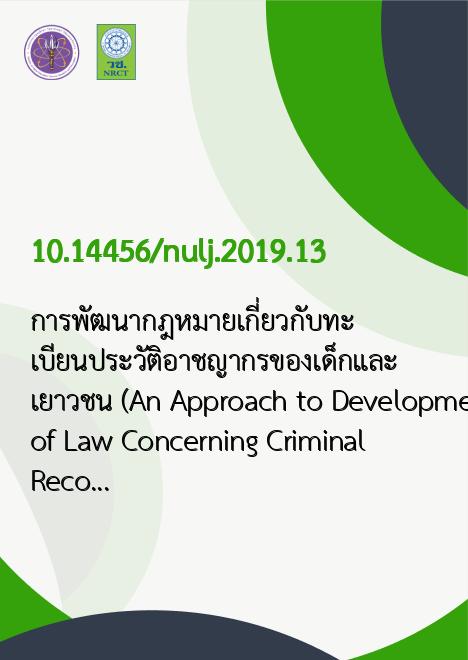
|
การพัฒนากฎหมายเกี่ยวกับทะเบียนประวัติอาชญากรของเด็กและเยาวชน (An Approach to Development of Law Concerning Criminal Record of Child and Juvenile) |
|---|---|
| รหัสดีโอไอ | |
| Creator | ปพนธีร์ ธีระพันธ์ |
| Title | การพัฒนากฎหมายเกี่ยวกับทะเบียนประวัติอาชญากรของเด็กและเยาวชน (An Approach to Development of Law Concerning Criminal Record of Child and Juvenile) |
| Publisher | คณะนิติศาสตร์ มหาวิทยาลัยนเรศวร |
| Publication Year | 2562 |
| Journal Title | วารสารนิติศาสตร์ มหาวิทยาลัยนเรศวร |
| Journal Vol. | 12 |
| Journal No. | 2 |
| Page no. | 87-111 |
| Keyword | การพัฒนา, ทะเบียนประวัติอาชญากร, เด็กและเยาวชน, Development, Criminal Records, Child and Juvenile |
| URL Website | https://www.tci-thaijo.org/index.php/lawnujournal/index |
| Website title | https://www.tci-thaijo.org/index.php/lawnujournal/article/view/200841 |
| ISSN | 1906425X (Print), 24653829(Online) |
| Abstract | การวิจัยครั้งนี้มีวัตถุประสงค์ (1) เพื่อศึกษาแนวคิดและทฤษฎีเกี่ยวกับกระบวนการยุติธรรมทางอาญาสำหรับเด็กและเยาวชน การแก้ไขฟื้นฟู การตีตรา และทะเบียนประวัติอาชญากร รวมถึงเพื่อศึกษาเปรียบเทียบหลักเกณฑ์ทางกฎหมายเกี่ยวกับทะเบียนประวัติอาชญากรของประเทศไทยและต่างประเทศ (2) เพื่อศึกษาและวิเคราะห์ปัญหาทางกฎหมาย และปัญหาทางสังคมที่มีผลกระทบต่อเด็กและเยาวชนซึ่งมีสาเหตุเชื่อมโยงมาจากทะเบียนประวัติอาชญากรของประเทศไทย รวมถึงเพื่อศึกษาและวิเคราะห์โอกาสในการเข้าทำงานใน สถานประกอบการ (3) เพื่อหาข้อเสนอแนะในการพัฒนากฎหมายเกี่ยวกับทะเบียนประวัติอาชญากรที่สอดคล้องกับพันธกรณีตามอนุสัญญาว่าด้วยสิทธิเด็ก และเป็นไปตามเจตนารมณ์ของกระบวนการยุติธรรมทางอาญาสำหรับเด็กและเยาวชนข้อมูลที่ใช้ในงานวิจัยมาจากการวิจัยเอกสารและการสัมภาษณ์เชิงลึก ซึ่งการสัมภาษณ์มีผู้ให้ข้อมูลสำคัญ 3 กลุ่ม คือ กลุ่มเจ้าหน้าที่ของรัฐที่ใช้อำนาจตามกฎหมายในกระบวนการยุติธรรมทางอาญาสำหรับเด็กและเยาวชน กลุ่มเด็กและเยาวชนผู้ได้รับผลกระทบจากทะเบียนประวัติอาชญากร และกลุ่มเจ้าของสถานประกอบการที่มีอำนาจพิจารณารับบุคคลเข้าทำงานโดยข้อมูลเชิงคุณภาพที่ได้จากการศึกษาและวิเคราะห์เอกสารต่าง ๆ และได้จากการสัมภาษณ์เชิงลึกถูกนำมาวิเคราะห์สาระให้เห็นความเชื่อมโยงและความสัมพันธ์กันในแง่ต่าง ๆ ซึ่งการวิเคราะห์จะออกมาในลักษณะของการพรรณนาผลการวิจัย พบว่า กฎหมายที่กำหนดหลักเกณฑ์ของทะเบียนประวัติอาชญากรของประเทศไทย ซึ่งได้แก่ ระเบียบสำนักงานตำรวจแหง่ ชาติ ว่าดว้ ยประมวลระเบยี บการตำรวจไม่เกี่ยวกับคดี ลักษณะที่ 32 การพิมพ์ลายนิ้วมือ ก่อให้เกิดสภาพปัญหาทางกฎหมาย 4 ประการ คือ ปัญหาเกี่ยวกับหลักเกณฑ์ทางกฎหมายเกี่ยวกับทะเบียนประวัติอาชญากร ปัญหาเกี่ยวกับเงื่อนไขของการคัดแยกทะเบียนประวัติอาชญากร ปัญหาเกี่ยวกับผู้มีสิทธิขอคัดแยกทะเบียนประวัติอาชญากร และปัญหาเกี่ยวกับระยะเวลาเพื่อเริ่มดำเนินการคัดแยกทะเบียนประวัติอาชญากร โดยปัญหาทางกฎหมายทั้ง 4 ประการนี้ก่อให้เกิดผลกระทบทางสังคมต่อตัวผ้กู ระทำความผิดที่เป็นเด็กและเยาวชน ทั้งผลกระทบด้านการสมัครงานและการทำงาน ผลกระทบด้านการสมัครเรียนและการเรียน และผลกระทบซึ่งถูกสังคมตีตราการเป็นผู้กระทำผิด เพื่อเป็นการพัฒนากฎหมายเกี่ยวกับทะเบียนประวัติอาชญากรของเด็กและเยาวชนในประเทศไทย งานวิจัยชิ้นนี้เสนอให้ฝ่ายนิติบัญญัติออกกฎหมายทะเบียนประวัติอาชญากรและควรกำหนดให้กรณีที่ศาลเยาวชนและครอบครัวได้พิพากษาลงโทษจำคุกเด็กหรือเยาวชน แต่เปลี่ยนโทษจำคุกเป็นส่งตัวไปฝึกอบรมตามมาตรา 142 (1) แห่งพระราชบัญญัติศาลเยาวชนและครอบครัวและวิธีพิจารณาคดีเยาวชนและครอบครัว พ.ศ. 2553 เป็นหนึ่งในเงื่อนไขของการคัดแยกทะเบียนประวัติออกจากสารบบด้วย นอกจากนี้ยังควรกำหนดให้สิทธิกับผู้มีชื่ออยู่ในทะเบียนประวัติอาชญากรที่เป็นเด็กและเยาวชน สามารถร้องขอให้มีการคัดแยกทะเบียนประวัติอาชญากรของตนได้ รวมถึงควรกำหนดระยะเวลาเพื่อเริ่มดำเนินการคัดแยกทะเบียนประวัติอาชญากรให้มีความชัดเจนและแน่นอนThis research has three objectives as (1) to study the concepts and the theories of juvenile justice, rehabilitation, labelling and criminal record, as well as to compare the laws concerning criminal records of Thailand and foreign countries, (2) to study and analyze both the legal and the social problems affecting to children and juveniles caused by the law concerning Thai criminal records, as well as to study and analyze the employment opportunity in business sectors, and (3) to seek the suggestion in order to develop criminal records law in accordance with Convention on the Rights of the Child and under the purposes of the juvenile justice.The information in the research was acquired by analyzing documents and in-depth interviewing of three groups of key informants, (1) the authorized government officers in juvenile justice system, (2) the children and juveniles who have been affected by criminal record, and (3) the business owners who has gained the employment power. The qualitative data studied and analyzed from the documents and the in-depth interview was analyzed for the contents and reflected relations by using the descriptive aspects.The findings revealed that the law concerning the criminal record in Thailand, Royal Thai Police Regulation on Police Code not concerning the Criminal Case Title 32 Fingerprint, has caused four legal problems. First is the problem about the form of the law concerning the criminal record. Secord is the problem about the element of the criminal record classifying. Third is the problem about the person who will have the right to make a petition for the criminal record classifying. And last is the problem about the starting time for the criminal record classifying process. These problems have subsequently resulted in the social problems consisting of the effect on job employment and work, education enrollment and study, and labeling reflection by the societies.To develop the law concerning juvenile criminal record in Thailand, this research suggests that the law should be enacted by the legislative, the court judgment under the section 142 (1) Juvenile and Family Court and Procedure Act B.E. 2553 should be one of the elements in criminal record classification, the name of the child or the juvenile should be authorized to make their petition of classifying, and the starting time for the criminal record classification process should clearly be written by the law. |